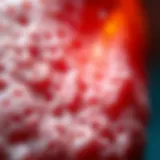Understanding the Role of Zinc in Human Health


Intro
Zinc is a trace element that is often overlooked yet is crucial for numerous bodily functions. It influences various physiological processes like immune response, enzyme activity, and cellular metabolism. Despite its importance, many individuals may not be consuming adequate amounts of zinc in their diets. This article aims to provide an in-depth examination of the essential functions of zinc and its implications on human health. By dissecting how zinc works within the body, identifying dietary sources, and addressing the consequences of deficiency, this narrative will offer a comprehensive overview of this vital nutrient.
Summary of Objectives
The primary aim of this article is to elucidate the critical role zinc plays in maintaining health. Through thorough exploration, it will detail its contribution to the immune system, its functionality in enzymatic reactions, and its impact on cellular processes. It will also provide clarity on dietary sources, recommended intake levels, and possible deficiencies.
Importance of the Research
Understanding zinc's multifaceted role equips individuals and professionals alike with vital knowledge to support wellness. As awareness grows regarding nutritional deficiencies in modern diets, this article serves as a guide for both academic and general audiences interested in nutrition and health optimization.
Results and Discussion
Presentation of Findings
Research shows that zinc influences over 300 enzymatic reactions in the human body. From metabolic processes to DNA synthesis, its functions are varied and essential. Moreover, zinc plays a pivotal role in supporting the immune system. A deficiency can lead to weakened immunity, which increases susceptibility to infections.
- Dietary Sources of Zinc:
- Meat (especially red meat)
- Shellfish (oysters are particularly high)
- Legumes (beans, lentils)
- Seeds (pumpkin seeds, sesame seeds)
- Nuts (cashews, almonds)
- Dairy products (milk, cheese)
- Whole grains
The recommended daily intake varies by age and gender, but generally, adult males require about 11 mg per day, while adult females need approximately 8 mg. When comparing dietary sources, animal-based sources provide zinc more efficiently than plant-based options due to the presence of phytates in plants that inhibit absorption.
Implications of Results
Zinc deficiency is associated with myriad health issues, including impaired wound healing, taste disorders, and growth retardation in children. In addition, inadequate levels of zinc can lead to a decline in cognitive function and overall health. Supplementation can be beneficial, particularly in individuals with limited access to dietary sources or those with specific health concerns.
"Zinc deficiency can create a cascade of health issues affecting various physiological functions, emphasizing the need for proper intake in daily diets."
Foreword to Zinc
Zinc is one of the most crucial trace minerals essential for various functions within the human body. Its significance extends into multiple physiological processes, making it an important topic for study. This section aims to provide an overview of zinc, its nature, and its historical relevance. Understanding the fundamental aspects of zinc lays the groundwork for exploring its biological importance, dietary sources, and effects of deficiency.
What is Zinc?
Zinc is a metallic element represented by the symbol Zn on the periodic table. It is classified as a transition metal and has atomic number 30. Zinc is found in various forms in the environment, including in soil, water, and minerals. While it is not produced naturally within the human body, it is absorbed through diet, playing a vital role in cellular functions. This mineral is known for its participation in over 300 enzymatic reactions, influencing various metabolic processes.
Zinc's unique properties allow it to stabilize protein structures and facilitate DNA synthesis. This makes it indispensable for growth, development, and overall health. It is available in both animal-based and plant-based food sources, further emphasizing its essential nature for human well-being.
Historical Context
The historical understanding of zinc dates back several centuries. Its discovery can be traced to ancient civilizations where it was used for medicinal purposes. In the 19th century, scientists began to recognize zinc's biological significance. It was established that zinc is a vital nutrient in the human diet.
In the early 1960s, researchers provideed evidence of zinc's role in health. This led to its acknowledgment as an essential nutrient necessary for immune function, wound healing, and DNA synthesis. The evolving knowledge about zinc has continued to shape nutritional guidelines and supplement recommendations.
The growing body of research on zinc reflects its importance. As we further explore zinc's biological functions, implications for health, and dietary considerations can emerge. This historical context helps us appreciate how zinc has been recognized over time and its growing significance in modern science and nutrition.
Biological Importance of Zinc
Zinc's significance in biological processes cannot be overstated. This trace element is vital for various physiological functions, affecting everything from enzyme activity to immune health. Zinc plays an undeniable role in numerous biochemical pathways. Understanding its functions enhances our knowledge of human health and the implications of zinc levels in the body.
Role in Enzymatic Functions
Zinc is a cofactor for over 300 enzymes in the human body. This means it assists in catalytic activity, necessary for enzyme function. Enzymes that rely on zinc include those involved in digestion, metabolism, and DNA synthesis. Without adequate zinc, these enzymes cannot work efficiently. As a result, metabolic processes may slow down. This can lead to nutritional deficiencies over time.


Notably, the enzyme carbonic anhydrase, which aids in the conversion of carbon dioxide and water into bicarbonate, is one such example. Enzymes that assist in antioxidant defenses also require zinc. When zinc levels are sufficient, these enzymes help combat oxidative stress. This contributes to better health outcomes.
Impact on Immune Health
Zinc has a profound impact on immune function. It is crucial for both innate and adaptive immunity. A deficiency can lead to weakened immune responses, making individuals more susceptible to infections. Zinc helps in the development and function of immune cells, such as neutrophils and natural killer cells.
Moreover, zinc influences cytokine production, which helps cells communicate during immune responses. Studies have shown that supplementation with zinc can reduce the duration of colds in healthy adults. This illustrates the element's potential in supporting immune health, especially in vulnerable populations.
Influence on DNA Synthesis
DNA synthesis is a critical process in all living organisms, and zinc plays a key role in this function. It serves as a structural component of DNA-binding proteins and enzymes necessary for DNA replication and repair. An insufficient amount of zinc can disrupt cell division and growth, causing abnormalities in DNA processes.
In particular, it is involved in the repair of DNA damage. This aspect is crucial because DNA integrity is vital for maintaining overall cellular health. If zinc is lacking, cells may face difficulties in replicating DNA accurately, which can eventually lead to mutations.
Contribution to Cellular Repair and Growth
Zinc is essential for cellular repair and growth. It is involved in the synthesis of proteins and promotes cell division. These functions are particularly important during periods of rapid growth, such as in childhood or recovery from injuries.
Topical zinc formulations are often used in wound healing. Zinc's role in collagen synthesis and inflammatory responses aids in tissue repair. When the body is under stress or has experienced injury, zinc can help accelerate the healing process.
Dietary Sources of Zinc
Understanding the dietary sources of zinc is crucial for grasping its essential roles in human health. Zinc is not produced by the body, necessitating its intake through food. A well-balanced diet containing adequate zinc is vital for various bodily functions, including immune support, cellular growth, and enzymatic reactions. Recognizing the best sources can help individuals make informed dietary choices to prevent deficiency and promote overall well-being.
Animal-Based Sources
Animal-based foods are among the richest sources of zinc. These foods provide zinc in a form that is more readily absorbed by the body compared to plant sources. Key animal-based sources include:
- Red meat, particularly beef and lamb.
- Poultry, such as chicken and turkey.
- Seafood, especially oysters, crab, and shrimp.
- Dairy products, including cheese and milk.
These sources not only supply zinc but also deliver other essential nutrients like protein and iron, contributing to a well-rounded diet. Regular consumption of these foods can help ensure adequate zinc levels, particularly for those at higher risk of deficiency.
Plant-Based Sources
While plant-based sources of zinc are generally less bioavailable, they remain important for those who follow vegetarian or vegan diets. Some notable plant-based sources include:
- Legumes, such as chickpeas, lentils, and beans.
- Nuts and seeds, with pumpkin seeds and cashews being particularly high in zinc.
- Whole grains, including oats and quinoa.
- Vegetables, like spinach and mushrooms, contain smaller amounts of zinc but can still contribute.
To enhance zinc absorption from these foods, consider consuming them with foods rich in vitamin C or soaking and sprouting them before cooking. This method reduces phytates, which inhibit zinc absorption.
Factors Affecting Zinc Absorption
Zinc absorption can be influenced by several factors. Understanding these can help optimize zinc intake from various dietary sources:
- Phytates, found in whole grains and legumes, can bond with zinc and reduce its absorption. Soaking, sprouting, or fermenting these foods can improve zinc availability.
- Dietary composition also matters. High-protein diets generally favor better absorption of zinc. Foods rich in animal proteins can enhance the bioavailability compared to plant proteins.
- Age and health status can affect absorption too. Young children, the elderly, and pregnant women may have different needs and absorption capabilities.
- Interaction with other minerals such as iron and calcium can impact zinc absorption. High doses of these minerals might interfere with zinc uptake, necessitating balanced consumption.
Understanding these factors helps in planning a diet that meets the zinc requirements. By being aware of sources and absorption considerations, individuals can effectively maintain adequate zinc levels, supporting their health.
Recommended Dietary Allowances
Understanding the Recommended Dietary Allowances (RDAs) for zinc is critical for ensuring optimal health. Zinc is an essential nutrient that supports various bodily functions, including immune response and enzymatic actions. Establishing these guidelines helps individuals and healthcare professionals make informed decisions regarding dietary intake.
Individuals need varying amounts of zinc based on age, sex, and life stage. RDAs are set by health organizations to offer a benchmark for adequate intake. The importance of adhering to these recommendations cannot be understated, as both deficiency and excess can lead to health complications.
Guidelines for Different Age Groups


Zinc intake recommendations differ across age groups, reflecting the unique needs of each stage of life. According to established guidelines:
- Infants (0-6 months): 2 mg
- Children (1-3 years): 3 mg
- Children (4-8 years): 5 mg
- Boys (9-13 years): 8 mg
- Girls (9-13 years): 8 mg
- Men (14-18 years): 11 mg
- Women (14-18 years): 9 mg
- Adult Men: 11 mg
- Adult Women: 8 mg
- Pregnant Women: 11 mg
- Lactating Women: 12 mg
These figures offer a framework for assessing dietary zinc needs. From infancy through adulthood, appropriate zinc intake plays a role in growth, development, and immune support.
Variations in Needs for Specific Populations
Certain populations may have increased zinc requirements due to various factors. The following groups often require careful dietary consideration:
- Pregnant and Lactating Women: Due to the needs of the developing fetus and breastfeeding, zinc levels should be monitored closely.
- Vegetarians and Vegans: Plant-based diets may provide less bioavailable zinc. It is important to consider these dietary patterns when evaluating intake.
- Individuals with Chronic Diseases: Some health conditions may impede zinc absorption or lead to increased need, such as gastrointestinal disorders.
- Elderly People: Aging can affect nutrient absorption and metabolism, leading to a heightened need for zinc.
Ensuring that these groups meet their zinc requirements is crucial to prevent deficiency. Regular monitoring and consultation with healthcare providers can help address their specific needs.
"Adequate intake of zinc is not just a matter of health; it is a pathway to ensuring well-being across different life stages."
Incorporating appropriate zinc sources into diets helps meet RDAs effectively. A balanced approach to dietary management fosters not only physical health but overall wellness.
Effects of Zinc Deficiency
Zinc deficiency presents significant concerns in various aspects of human health. Understanding these impacts is crucial for recognizing the importance of adequate zinc levels. Zinc is not merely a trace mineral; it is integral to numerous physiological functions including metabolism, immune response, and cell division. Insufficient zinc can lead to disruptions in these essential processes, resulting in chronic health problems. Thus, examining the effects of zinc deficiency clarifies its vital role in maintaining overall health.
Physiological Consequences
The physiological repercussions of zinc deficiency are multifaceted. Zinc plays a critical role in the structure and function of enzymes. Enzymatic reactions essential for digestion and energy production may be hampered due to low zinc levels. Hormonal regulation can also be affected; zinc is important in synthesizing insulin, which is necessary for glucose metabolism. Additionally, a lack of zinc can adversely impact protein synthesis, leading to issues in growth and tissue repair. The body’s ability to heal wounds efficiently may also decrease, further complicating recovery from injury.
Symptoms of Deficiency
The symptoms associated with zinc deficiency can vary but are typically observable and often systemic. Some common symptoms include:
- Impaired immune function, increasing susceptibility to infections
- Poor wound healing, resulting in longer recovery periods
- Hair loss and skin lesions, often appearing as rashes or irritation
- Altered taste and smell, impacting the appetite
- Diarrhea or gastrointestinal disturbances
These signs may serve as crucial indicators of zinc deficiency and should not be overlooked. If left unaddressed, they can deteriorate one's quality of life, leading to more serious health issues.
At-Risk Populations
Certain groups are particularly vulnerable to zinc deficiency. Understanding these populations aids in identifying who may require dietary assessment and possible supplementation.
- Children: Rapid growth demands higher zinc intake to support development.
- Pregnant and breastfeeding women: Increased nutritional needs can lead to deficiency.
- Elderly individuals: Aging can affect absorption and dietary intake, placing them at risk.
- Vegetarians and vegans: Plant-based diets may provide less bioavailable zinc compared to animal sources.
- Individuals with gastrointestinal diseases: Conditions such as Crohn's disease can impair zinc absorption.
Addressing the dietary needs of these at-risk groups is essential, as it can prevent the adverse effects that stem from insufficient zinc intake.
"Zinc deficiency can lead to significant health impactions, reinforcing the necessity of regular monitoring and intake of this vital mineral."
Potential Benefits of Zinc Supplementation
Zinc supplementation has gained attention for its potential benefits in enhancing health and well-being. This section will explore various advantages of zinc, underscoring its importance in various physiological processes that are crucial for maintaining good health. The nuances of how zinc supplementation can affect different health aspects are worth noting, especially considering the demands of modern lifestyles.
Immune Function Enhancement
One of the primary benefits of zinc supplementation is its role in immune function. Zinc contributes to various immune processes, including the development and function of immune cells such as T lymphocytes and neutrophils. It helps modulate immune responses, which may enhance the body's ability to respond to pathogens.
Research indicates that zinc deficiency can lead to a weakened immune response, making the body more susceptible to infections. By supplementing with zinc, individuals may strengthen their immune systems, particularly during cold and flu season. Studies show that those who take zinc supplements may experience a reduction in the duration and severity of respiratory infections.
Wound Healing Support


Zinc plays a crucial role in wound healing, making its supplementation significant for recovery processes. The trace element is essential for skin integrity and function. It is involved in the synthesis of proteins and collagen, which are vital for repairing damaged tissues.
Individuals with zinc deficiency often experience delayed wound healing. In contrast, adequate zinc levels can promote faster recovery from injuries and surgical procedures. Some studies suggest topical zinc formulations can also significantly enhance the healing of wounds.
Role in Growth and Development
Zinc is particularly important for growth and development, especially in children and adolescents. It is a key factor during periods of rapid growth, where the demand for nutrients increases. Adequate zinc levels during these developmental stages support proper physical and cognitive development.
Zinc deficiency in young individuals can lead to stunted growth and developmental delays. Supplementation can ensure that children receive the necessary amount of this essential mineral. For pregnant and breastfeeding women, zinc is equally critical for fetal and infant development, promoting healthy outcomes.
In summary, zinc supplementation can provide various health benefits, including enhancing immune functionality, promoting wound healing, and supporting growth and development. Understanding these benefits can empower individuals to make informed decisions about their dietary choices and supplementation needs.
Risks of Excess Zinc Intake
Understanding the risks associated with excess zinc intake is crucial for maintaining a balanced and healthy diet. Zinc, while essential for numerous bodily functions, can become toxic when consumed in high amounts. This section will examine the toxicity symptoms, interactions with other nutrients, and the recommended upper limits for zinc intake. Recognizing these factors can help prevent negative health effects that might arise from improper use of zinc supplements or excessive dietary intake.
Toxicity Symptoms
Zinc toxicity can manifest in several ways, often leading to uncomfortable and sometimes serious health issues. Common symptoms may include:
- Nausea and vomiting: These are often the first indicators that zinc levels may be too high. The body reacts to excess zinc as it tries to rid itself of the overload.
- Diarrhea: Excessive zinc can disturb the gastrointestinal tract, resulting in loose stools.
- Headaches: A common neurological symptom that may arise from elevated zinc levels, affecting cognitive clarity.
- Fatigue: High zinc levels can lead to a sense of lethargy or fatigue, which can impact daily activities.
- Metallic taste: Individuals may notice a persistent metallic flavor in their mouth, a direct consequence of high zinc levels.
- Impaired immune response: Ironically, while zinc supports immunity, too much can lead to a paradoxical weakening of immune function.
These symptoms are indicative of a need for immediate attention to dietary practices. It is vital for individuals to monitor their zinc intake, especially if supplementing with zinc-rich products.
Interactions with Other Nutrients
Zinc does not function in isolation. High levels of zinc can interfere with the absorption and metabolism of other essential nutrients. Key interactions include:
- Copper: Excess zinc can inhibit copper absorption, leading to potential deficiencies of this critical mineral. Copper is vital for iron metabolism, neurological function, and the formation of connective tissues.
- Iron: High zinc levels can influence iron metabolism and its bioavailability in the body. This can be particularly concerning in populations with already low iron levels, as it may exacerbate iron deficiency anemia.
- Calcium: Similarly, excess zinc can affect calcium absorption, which is crucial for bone health.
Not only does this impact overall nutrient balance, but it can also lead to additional complications related to mineral deficiencies. Thus, it is prudent to evaluate zinc intake alongside other dietary components.
Recommended Upper Limits
To avoid toxicity, it is important to be aware of the upper limits set by health authorities. The Institute of Medicine suggests an upper intake level of:
- 40 mg per day for adults
- Tolerable Upper Intake Levels (ULs) vary based on age group and population, so it is advisable to consult guidelines specifically for children and pregnant or lactating women.
These limits are not suggestions to consume that amount but rather a maximum threshold to prevent the aforementioned health issues. Combining this knowledge with awareness of dietary sources can help individuals maintain a healthy intake of zinc without pushing beyond safe limits.
Consuming zinc within recommended levels is essential for harnessing its benefits without encountering health risks.
The crux of managing zinc intake lies in balance. Individuals intending to supplement their diet with zinc should assess their current dietary habits and healthcare advice to ensure they are making informed choices.
Closure
Zinc plays a crucial role in human health, affecting numerous physiological processes that are vital for our functioning. The conclusion of this article emphasizes the necessity of understanding zinc's multifaceted functions. Not only does it perform key enzymatic activities, but it is also integral to immune system health and cellular repair mechanisms. Recognizing the importance of this trace element sets a foundation for better dietary choices. It highlights that a balanced intake of zinc is vital in preventing deficiency or toxicity. This understanding can direct individuals and health professionals to more effectively manage zinc levels through dietary sources and supplementation.
Summary of Zinc’s Role in Human Health
Zinc’s roles are diverse and significant. This trace mineral is essential for over 300 enzymatic reactions within the body. It contributes to processes like DNA synthesis, protein metabolism, and the maintenance of cell membranes. Moreover, zinc is crucial for the immune system, as it influences the function of immune cells and inflammatory response.
Zinc deficiency can present various problems. Symptoms range from impaired immune function to skin issues and cognitive disturbances. Conversely, adequate zinc levels support not just physical health but also mental and emotional wellness. It is also necessary for normal growth and development.
Final Thoughts on Dietary Management
An optimal intake of zinc is not just about avoiding deficiency; it's about promoting overall health and preventing potential adverse effects. Individuals should be aware of dietary sources, which can include both animal-based options like red meat and plant-based sources such as legumes and nuts. However, the absorption of zinc can be influenced by various factors, including dietary composition and age.
When considering supplementation, it is essential to acknowledge the risks involved with excess intake. It is recommended to consult with healthcare professionals when making decisions about dietary management. In summary, a well-rounded approach to zinc consumption can lead to improved health outcomes and better quality of life.
"A balanced understanding of zinc's role is fundamental for health optimization."
For more information on dietary sources of zinc, visit Wikipedia.















